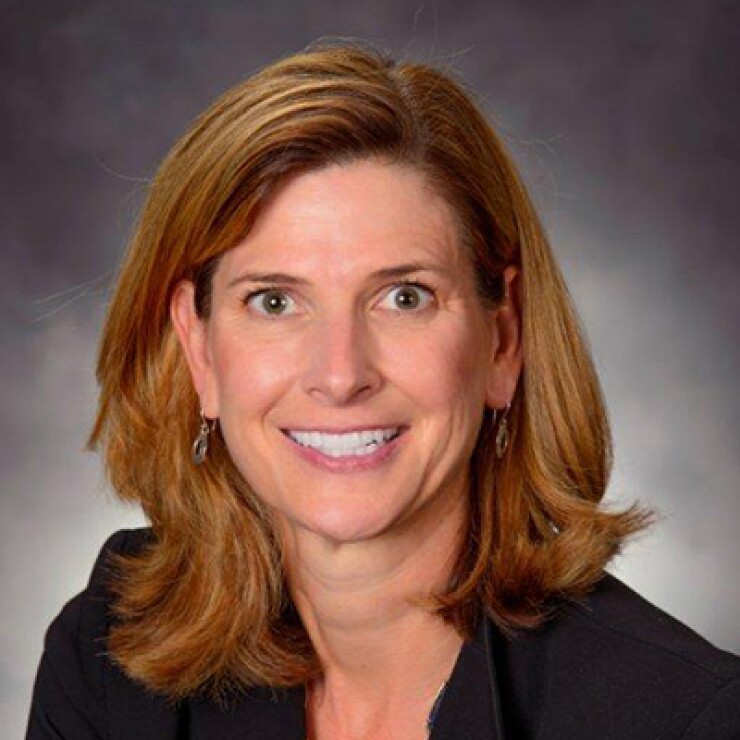Truist Financial, through its predecessor SunTrust Bank, began its securitization business offering trade accounts-receivable securitizations to its investment-grade clients. It subsequently expanded into providing warehouse facilities, focusing on esoteric asset classes whose smaller deal size allows for greater diversification. In 2017, the firm added term ABS capabilities enabling clients to access financing from institutional investors. Then following the 2019 merger with BB&T, Truist expanded its client coverage further, to include so-called "flow" asset classes.
The bank continues to support securitizations of esoteric assets, including rental car leases, consumer loans, triple-net leases, small business loans, and whole-business revenues. It has also become a major player on the flow side, participating in and leading the credit card, auto and other securitizations of mainstream assets that larger issuers pursue routinely.
Janet Jarrett, formerly head of SunTrust's asset-based lending group and currently leading Truist Securities' asset-finance group, spoke to Asset Securitization Report about Truist's current approach to the securitization business and key market developments.
Asset Securitization Report: Truist is active in both esoteric and flow asset classes—does it specialize in certain asset types?
Janet Jarrett: We have a well-diversified portfolio and we're very focused on that from a risk-management and risk-mitigation standpoint. Having said that, we do have a specialty niche in small-ticket leasing, such as small-ticket equipment leases—items with a purchase price of less than $150,000, for example. That could be medical or computer equipment, or small machinery.
ASR: And on the flow side?
JJ: Credit cards, prime auto, those types of products.
Our partners on the banking side have target clients and prospects. We support them with the securitization product.
ASR: Truist structures those deals?
JJ: We are client focused, so our goal is to have a bit of share-of-mind with our clients so we then can structure deals to meet their objectives. We strive to be the lead arranger in those transactions.
ASR: Do most of Truist's ABS deals stem from Truist bankers' client relationships?
JJ: Our partners on the banking side have target clients and prospects. We support them with the securitization product. In all circumstances, we would be partnering with our bankers, to ensure we're developing and enhancing that strategic relationship.
ASR: What trends are you seeing on the flow side?
JJ: All eyes are on the consumer, things like unemployment and consumer spending habits, because that will feed into several asset classes. If consumers start losing their jobs, that's typically a precursor to defaults in credit card space and auto … [the] sectors that may be affected by an economic downturn.
Our clients are watching the same things, and they're being very mindful about the type of underwriting they're doing. In some instances, they're adjusting their underwriting standards to reflect market conditions or the anticipated market.
ASR: Are they taking a more cautious approach to underwriting?
JJ: As they think through the FICO scores that they may be considering, they'll be much more mindful at the lower end of the range, anticipating how those loans typically perform over the economic cycle—a heightened sense of awareness at this point.
ASR: How might that impact ABS?
JJ: From a macro perspective, if the flow into warehouse facilitates slows, in whatever asset category, then the volume being securitized will also slow. So we may see a bit of a slowdown in overall market volume.
ASR: When might that happen?
JJ: It depends on your economic crystal ball. If we head into a recession, things will slow down, and then as people start to feel better about the economic prospects it will start to ramp up again.
ASR: What is the outlook for deal flow on the esoteric side?
JJ: Esoteric deals have always had a high level of due diligence associated with them, and I don't think the analytical rigor has changed for those asset classes. Similar to flow asset classes, the esoteric origination volume will ebb and flow based on overall economic conditions.
ASR: Are you seeing new esoteric assets being securitized?
JJ: There's less conversation about specific new asset classes and more about looking at monetizing contracted revenue streams to get the best liquidity. That's the lens now, as opposed to saying, "I have this newly defined asset, what can I do with it?"
ASR: How do you define "contracted revenue streams?"
JJ: It's recurring revenue supported by long-term contracts … for example, monthly payments from franchisees or data centers. Some assets may be more unique, like music-royalty revenues.
ASR: And how do they monetize those assets?
JJ: I may sell a product or service that averages $30/month and over the course of a year collect $360. Or I can say that I have these contracts that will pay $30/month over the next five years, so what additional value can I get out of that certainty of future revenue.
ASR: What's driving the focus on contracted revenues?
JJ: It's broadening the conversation. If you look at the flow and esoteric businesses, those are contractual revenues. So people are looking across the landscape and saying, "Where are my contractual revenue streams?"
ASR: What issues do you see ahead for the securitization market?
JJ: Considering the focus on contracted revenue and growth in technology, I do think application of the ABS product will expand … think of solar panels people are putting on their houses. So we're probably going to see continued product expansion. And while we will see ABS market volume ebb and flow along with the economic cycle, from a very macro perspective products that tend to be more closely tied to the assets, like asset-based lending and securitization, typically see more resilience during times of economic uncertainty. We're certainly seeing that today with the ABS market.
I would underscore that our clients' needs and changing liquidity requirements are driving a lot of the innovation in the ABS market, and that's the lens through we look at the transactions.






